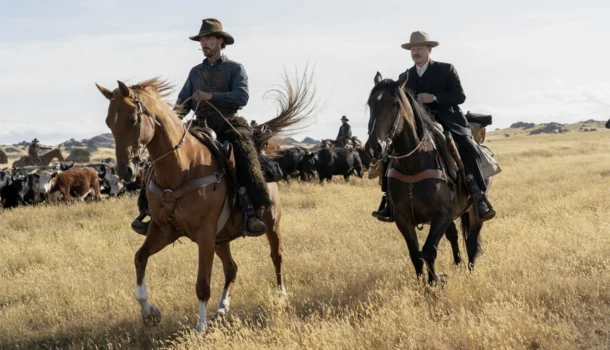The western, traditionally celebrated as a mirror of America’s founding narratives, has been progressively reshaped to embrace more nuanced and unsettling perspectives. With “The Power of the Dog” (2021), Jane Campion rewrites the genre’s grammar without resorting to overt acts of rupture. Instead of confronting classic archetypes head-on, she dismantles them from within, exposing the hidden fractures beneath her characters’ hardened exteriors. Benedict Cumberbatch, whose career has been defined by roles of sharp intellect and controlled eccentricity, finds here a part that demands not just transformation, but the deliberate abandonment of any interpretative safety net.
Phil Burbank, portrayed with piercing intensity by Cumberbatch, embodies a masculinity forged in harshness, where brutality is not merely a byproduct of environment, but a conscious strategy to suppress emotions deemed unspeakable. His silent devotion to Bronco Henry — an absent mentor and idealized idol — stains every gesture and glance of disdain he directs toward anyone who threatens his rigid emotional isolation.
The narrative deepens with the arrival of George, Phil’s brother, played by Jesse Plemons. With his solid calmness and disarming kindness, George represents a viable alternative to Phil’s corrosive rigidity. The brothers’ encounter with Rose (“Kirsten Dunst”) and her son Peter (“Kodi Smit-McPhee”) ignites dormant tensions. When Phil discovers that the delicate paper roses adorning Rose’s restaurant were crafted by young Peter, silent discomfort quickly gives way to public humiliation — a desperate effort to crush what he both fears and longs for.
The marriage between George and Rose, far from symbolizing tenderness overcoming hostility, instead catalyzes the deterioration of the domestic environment. Rose’s presence, combined with Phil’s growing alcoholism and oppressive surveillance, creates a household cold war, where battles are waged through silences and sidelong glances more than words.
Adapting Thomas Savage’s novel “The Power of the Dog,” Campion resists any overt articulation of Phil’s homosexuality, instead allowing the audience to uneasily piece together the signs of an unspoken anguish. Peter, with his fragile appearance and strategic intellect, is simultaneously a victim and the architect of a slow subversion of Phil’s defenses. Their relationship unfolds through the smallest gestures, with each interaction bearing the weight of what remains unspoken.
Campion’s construction rejects easy resolutions: Phil is not redeemed, and Peter is far from an innocent. The interplay of repression, desire, and resentment reaches a silent and unexpected climax, defying any expectation of traditional catharsis. The story revolves around what is forbidden to exist: repressed love, denied vulnerability, internalized violence.
“The Power of the Dog” does not merely redefine the western; it exposes it, tears apart its symbolic armor, and proposes something even more disturbing: that the true danger was never in the shootouts or sweeping plains, but in the inner caverns each tries so desperately to conceal. In its dense and haunted cadence, Campion issues a challenge: to see the western not as a stage for bravery, but as a minefield of silenced emotions and incurable wounds.
Film: The Power of the Dog
Director: Jane Campion
Year: 2021
Genres: Drama/Western
Rating: 10

